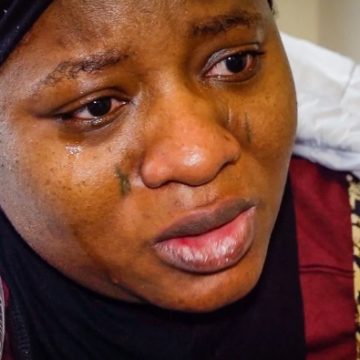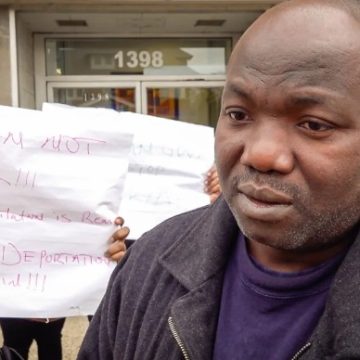The Bakare family fled Nigeria out of fear their daughter would be subjected to female genital mutilation Members of a Nigerian family living in Windsor say they fear for their lives as a result of media attention they’ve received after a deportation order previously issued by the Canadian government.
Rasheedat Bakare, her husband Afeez, son Faaiq and daughter Faiqah all fled Nigeria and arrived in Canada in 2017. The family’s youngest daughter Farhana was born in Canada in 2018.
The family of five was denied refugee status last Thursday and were told to leave the country by 3 p.m on Friday.
“My children’s life, my husband’s life is at risk,” said Rasheedat Bakare. “We ran away because they wanted to circumcise my baby girl — the one I brought from Africa. When I got to Canada, I had another baby girl. Currently, I’m pregnant with another baby girl. Now [I’ll have] three baby girls — [and all of their lives are] going to be at risk.”
ALSO READ: Masari inaugurates committee on administration of criminal justice
The family’s case caught the attention of the African Community Organization of Windsor (ACOW), a group that staged a protest last Friday outside the office of Windsor West NDP MP Brian Masse.
Claude Saizonou, president of the ACOW, said his group gathered outside Masse’s office because “we’ve been through this kind of situation so many times.”

“We never react. We never say anything,” he said. “And we just have [had] enough of it. We just want to stand up and say ‘If we don’t do it, nobody would do it for us.’ And this family has to stay today.”
On Friday afternoon, after Rasheedat — who is approximately five months pregnant — collapsed and was rushed to the hospital, the government issued a temporary delay on the deportation order.
Claude Saizonou, president of the African Community Organization of Windsor, says his group gathered outside Brian Masse’s office because “we’ve been through this kind of situation so many times.” (Rozenn Nicolle/Radio-Canada)
Afeez Bakare said he’s not sure when he and his family will be required to leave.
“I don’t want my life and my family to be in danger,” he said. “My wife is in a state where she is restless, she cannot do anything.”
ALSO READ: Smart city: Sanwo-Olu launches N250m seed capital for tech start-up
Rasheedat Bakare was released from the hospital on Saturday.

“What led her to have a shock has not yet been resolved, said Afeez Bakare. “So she has been crying ever since she left the hospital.
Bakare says that he fears for his family’s lives because of the media attention his family has received.
“People from home, now they know that I’m in Canada,” he said. “If I go back home, they are going to kill me, they’re going to kill my wife,” he said.
Masse described the federal government’s treatment of the Bakare family as “heavy-handed,” adding that it was even logistically difficult for the family to comply with the deportation order in the first place, simply because of how little time was given.
At the same time, Masse pointed out that Farhana, who was born in Canada in 2018, is a Canadian citizen, complicating matters further.
“[There are] very significant issues related to health, personal safety and just the capability financially of being able to [leave the country],” he said.
A spokesperson for the Canadian Border Services Agency (CBSA) said the federal Privacy Act prevents the organization from “providing comments or details on this specific case.”
“The decision to remove someone from Canada is not taken lightly,” said Judith Gadbois-St-Cyr with the CBSA, in an email sent to CBC News on Monday. “The Immigration and Refugee Protection Act (IRPA) states that removal orders must be enforced as soon as possible.”
ALSO READ: Ekiti varsity sacks over 600 workers, cites irregular employment
“Prior to removal, individuals may seek leave for judicial review, as well as administrative review procedures that assess the potential risk to the person of returning to the country of origin. Everyone ordered removed from Canada is entitled to due process before the law and all removal orders are subject to various levels of appeal.”
The family has limited options, says immigration consultant
Marwan Zarif, an immigration consultant who founded Canada by Choice in Windsor, said the Bakare family has a few options to appeal their deportation.
Their first option is to file for a pre-removal risk assessment.
“The problem with this pre-removal risk assessment is that immigration has to send you a form to fill,” said Zarif. “You can’t just apply for it.”
The immigration board hasn’t been listening to a lot of cases.- Marwan Zarif, Immigration Consultant and Founder of Canada by Choice.
In effect, the risk assessment allows the federal government to determine the overall risk of persecution by returning to a country.
Zarif said there are some drawbacks associated with the pre-removal risk assessment, namely that potential applicants need to wait at least one year before they can submit a form.
A second option is to apply to the refugee appeal division part of the Immigration and Refugee Board of Canada.
However, Zarif said the appeal division “hasn’t been very active.”
“The immigration board hasn’t been listening to a lot of cases,” he said. “Unfortunately, this is how it is.”
If a refugee appeal is denied, Zarif said the Federal Court of Canada is also a means of recourse.
“The good thing about it is it’s outside the immigration system, so it’s not influenced by immigration regulations,” he said. “It’s a different body of immigration.”
WATCH TOP VIDEOS FROM NIGERIAN TRIBUNE TV
- Let’s Talk About SELF-AWARENESS
- Is Your Confidence Mistaken for Pride? Let’s talk about it
- Is Etiquette About Perfection…Or Just Not Being Rude?
- Top Psychologist Reveal 3 Signs You’re Struggling With Imposter Syndrome
- Do You Pick Up Work-Related Calls at Midnight or Never? Let’s Talk About Boundaries







